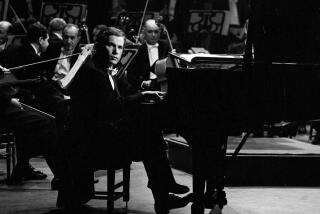Rewards From Green at N.Y. Fest
- Share via
NEW YORK — As the JVC Jazz Festival moved into its final weekend, one of the most rewarding concerts was performed Friday before a small audience at the intimate Weill Recital Hall by the 27-year-old pianist Benny Green.
After attracting interest for several years through appearances and recordings with Betty Carter, Art Blakey and others, Green today is moving rapidly into the front rank of young, bop-inspired acoustic improvisers. Never on record has his technique been so impressive, nor his use of it more felicitous than on this occasion.
He opened with a somewhat bland treatment of “Namely You,” then warmed up with a tender “Come Sunday” and “Starcrossed Lovers” by Ellington and Strayhorn. It was during Bud Powell’s “Celia” that his true self-image appeared. He attacked the fast-moving bop theme voraciously, playing it simultaneously in parallel lines with both hands.
Later he applied this doubled-up process to improvised lines, executed with astonishing dexterity. His affection for the bop era was faithfully recalled in his treatment of Monk’s ballad “Ruby My Dear.”
Green is a student of the veteran pianist Walter Bishop Jr., who was in the audience. Bishop can take pride in his bright young protege.
Later, next door at Carnegie Hall, Stan Getz made one of his now-rare appearances (since a bout with cancer two years ago he has paced himself carefully). With Dexter Gordon, Zoot Sims and Al Cohen gone, the ranks of the great tenor saxophonists are thinning; Getz is the last of a vital creative breed.
Any concert that offers an opportunity to hear Getz play Billy Strayhorn’s “Blood Count” is, ipso facto, richly rewarding. He applied his nonpareil sound and wrenching emotion to this work, as well as to Mal Waldron’s “Soul Eyes” and Johnny Mandel’s “El Cajon” (dedicated to the late Al Cohen).
Getz was matched by the consistently swinging Kenny Barron, who has been his pianist off and on since 1974; by Alex Blake, who on one tune doubled his bass lines with vocals a la Slam Stewart; and by the young, occasionally obtrusive drummer Terri Lyne Carrington.
The rest of the concert involved two additional musicians, playing synthesizers. One of them, Eddie del Barrio, wrote or co-wrote several of the tunes for the latest Getz album. On these numbers Blake switched to electric bass and Getz, who had dispensed with the mike entirely on some of the quartet pieces, was amplified. With the exception of Mike Lang’s engaging “Lonely Lady,” these were sextet experiments in largely overall sound while reducing the impact of Getz’s solos.
It was a pleasure to see him return, for an encore, with just Kenny Barron, for a duo version of Benny Carter’s “People Time” that brought out the tonal beauty of which he is a master.
More to Read
The biggest entertainment stories
Get our big stories about Hollywood, film, television, music, arts, culture and more right in your inbox as soon as they publish.
You may occasionally receive promotional content from the Los Angeles Times.










